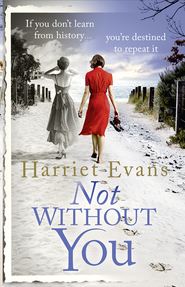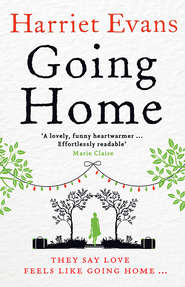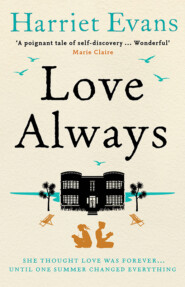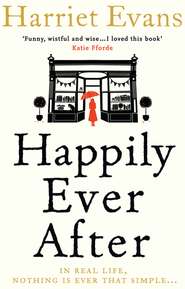По всем вопросам обращайтесь на: info@litportal.ru
(©) 2003-2025.
✖
A Hopeless Romantic
Автор
Год написания книги
2019
Настройки чтения
Размер шрифта
Высота строк
Поля
She tried to think of something to say back to him, something grand, something great, something worthy of Carrie Bradshaw or Barbra Streisand in The Way We Were. But there was nothing to say, and the moment wasn’t about that any more. There was nothing for her to do but leave, and as she stood in the frame of the doorway, she half-waved at him, and turned and quietly walked down the stairs again.
CHAPTER TEN (#ulink_111f9304-ffc9-5776-8e91-f0d248f0da6b)
Laura’s other granny, who had died ten years previously, was very much like her son George. Deidre Foster was a paragon of respectability, her home a shrine to suburban living. When the neighbours put their house on the market in 1980, the potential crisis of unruly or undesirable new people next door almost sent her into a decline. Hers was the only home in which Laura had ever seen a knitted toilet-roll holder. She had vases screwed into the walls with dried flowers in, a tasteful landscape photograph printed on canvas and framed in gold above the (fake) fireplace, and two tea services: one for everyday, and one for Sundays and special occasions.
Deidre had a saying for every occasion, it was her stock-in-trade. This one predictable trait offset the others, made her more likeable, more human sometimes. It was an instinctive emotion in an otherwise reserved woman, this desire to soothe, to mend, to make things better. ‘Hold your head up high, and don’t let them see you cry.’ ‘It’ll all come out in the wash.’ ‘Better safe than sorry.’ ‘A stitch in time saves nine.’ ‘More haste less speed.’ (That one, in particular, had never made any sense to Laura.) ‘Too many cooks’ and so on. As Laura and Simon grew older, they had become squirmingly predictable, a sign for each of them to avoid the other’s eye and stuff their fists in their mouths so as not to laugh. They had never seen the point of them, never listened between each of those lines to what lay beneath – their grandmother’s desire to help, to give advice, to rationalise a world she sometimes found baffling and could not talk about for fear of breaking down and betraying herself and everything she had built up to be important.
As Laura marched briskly out of the pub, she paused for a split second at the door, clutching the old brass handle, her hand smearing the metal with perspiration. Her vision blurred as her eyes filled with heavy, painful tears. She knew he would be watching out of the window as she left. She had to hold her head up high. She couldn’t let him see how hurt she was. This wasn’t Mary and Guy, and their early morning moment in the pyramids, this wasn’t it at all. It was all a lie. She was Granny Deidre’s granddaughter; she would repress all her natural urges, bite down her feelings and walk calmly under the window where Dan would be watching, away from the moonlight glow of the lamppost on the corner, up Rathbone Street till she could safely turn the corner. And then she could collapse, and scream. Hold your head up high, and don’t let them see you cry. Granny Deidre had said that to Laura when Laura was being bullied by a particularly vicious girl at junior school. It was good advice then, and it was good advice now.
Legs shaking, eyes still filled with tears, Laura walked along the street, up Conville Place, past the cafés where people were sitting and enjoying the evening’s warmth. A man at a table on the corner raised his espresso cup to her and nodded as she turned left and headed down into Mortimer Street. He raised his eyebrows as Laura stopped, put the ball of her hand flat against her lips and cheek, and breathed deeply, expecting the tears to flow.
But they didn’t. She couldn’t cry. It was as if she were in a shock so sudden she didn’t know how to react. The clarity of her mind startled her. It was over with Dan, there was no question that it wasn’t. There could be no reconciliation, no ‘I’ve changed my mind’, no ‘I’m leaving her’. Amy was pregnant, and whatever happened between them, Laura had to be out of it. She was surprised, she noted with detached interest, that she could see it with such clarity, that it wasn’t mired for her in a welter of excuses and what-might-have-beens. No. It was over.
Laura strode down Mortimer Street, welcoming the cool breeze that played around her shoulders and the back of her neck after the unbearable heat of the restaurant. Ahead of her stretched the city, unfurling into relaxation, gently welcoming, quiet and warm and beautiful. She passed the wide, dark driveway of the ornate Royal Marsden Hospital, and carried on walking.
She probed her feelings delicately, like a child touching the cavity of a newly lost tooth, to see how it hurt, where it hurt, how much. It was strange, foreign to her, she didn’t know how to deal with it, and so she kept on walking into the night, along the wide street, the branches of the trees that lined it gracefully dipping and framing her in the quiet breeze.
She had lost her job. She had lost her best friend. She had lost – she winced suddenly as she thought of it – nearly all the money she had in the world on a holiday she now wouldn’t be going on. For what? For a golden dream, a sweet, stupid boy with a beautiful smile. For that. For someone who had never even given her any definite idea of his commitment to her. He loved her, she knew that. He was going to leave his girlfriend, she knew that. But how and when and what would happen after that – she had never had any idea.
Laura had reached Regent Street. She looked about her, bewildered at the purr of sudden, slow-moving traffic. Down to her left lay the lights of Oxford Circus, the permanent chaos and snaking crowds of people visible to her even now. To her right loomed the ascetic outline of All Souls Church and Broadcasting House behind it. Ahead lay the white-faced formal squares behind Oxford Street. Where was she going? She didn’t know. She couldn’t face Paddy or being at home just yet. She just wanted to walk.
So she did. She crossed the road and carried on, through the impersonal grandness of Cavendish Square, past Coutts, past the Wigmore Hall, along the jumble of shops and mansion blocks on Wigmore Street. She kept a steady pace, not swerving or stopping, just walking, looking ahead, pounding the streets, trying to walk herself back into sanity. She had to keep on going; it was rather like being very drunk and trying not to throw up in the back of a cab or a bus that was speeding you safely home, wishing with all your heart you could be outside.
She walked until she could see the vast space of Portman Square and the back of Selfridges looming up ahead of her. She didn’t know what to do then – didn’t want to go towards the roaring hustle of a main road. She could go and see Mary, she thought suddenly, and then her heart sank. No, of course she couldn’t. This wasn’t the kind of situation her grandmother had ever found herself in. Better to keep on walking. So she ducked right, up the Georgian Duke Street to gracious, leafy Manchester Square, past the Wallace Collection, its windows black and unblinking. She turned into Manchester Street, and crossed the road.
Suddenly a car swerved around the corner and nearly smashed into her. It missed her by a hair’s breadth, and the driver swore at her and sped on, not even pausing. Laura fell against a car, and ricocheted slowly off it so she was sitting on the edge of the kerb in between two parked cars.
Then she cried; consumed with the shock, the loneliness, the feeling of terror that had flashed through her. She cried silent great heaving sobs, fat tears spilling out of her, dropping between her legs into the gutter. She felt totally alone; powerless, with nowhere to turn. She was bone-weary, flattened. And, most of all, she felt stupid.
Amy was pregnant. She and Dan were going to have a baby, an actual live baby. This was reality, not the dream world she, Laura, had invented for herself about it all. How could she have been so naïve, so stupid? What was she doing?
Laura ran her hands through her hair, riding out the jerking sobs that racked through her. As they subsided, she breathed out, and a juddering, blubbery sound escaped her that even she, in her darkest hour, found strangely funny. It made her smile to herself, a wobbly smile. She chewed her lip, still sitting on the edge of the kerb, and sat motionless for a moment. When was the last time she’d actually had a relationship based on reality, instead of some completely invented fantasy she’d written in her head? In her stupid, silly, romantic head.
The calm after her crying was cathartic. Laura stood up slowly, her legs shaking, and took a deep breath, feeling as if she was breathing properly for the first time that night. She exhaled again and closed her eyes. So far so good. It was deathly quiet on the street, and nothing broke the silence. She started walking again, more slowly.
But emotional exhaustion is a curious thing; it can be as debilitating as physical exhaustion. Suddenly she was tired, dog-tired, and when a black cab swung into view a few seconds later she hailed it gratefully, and sat huddled in the back, staring blankly out of the window for the journey home. She crawled up the steps to the flat, vaguely stabbing at the front-door lock with her key more in hope than in expectation of being allowed in. She was back at home, in her flat, and beyond thinking about anything else she knew she was safe again. She wanted to sleep, that was all she could think about. For once in her life she didn’t know what she was going to do now, and she was too tired to let the thought surprise her. It was over, and she was going to sleep, and beyond that Laura didn’t care about anything any more.
CHAPTER ELEVEN (#ulink_43e1af1f-2f51-5bca-b740-02e0333b85b2)
Laura couldn’t remember going to bed. She didn’t remember much, and when she woke up it was early Saturday afternoon. Which meant that she had slept for around twelve hours. She had no job to go to on Monday, no friends, no money, no Dan…She rolled over and closed her eyes again. Her pyjamas were sweaty, and so was she. She tried to think about the previous night, reached for her phone to check for messages, and then swallowed and gripped her hands into fists. She wasn’t going to. She felt nothing, nothing at all, and she closed her eyes again, and sank back into an exhausted, defeated sleep.
When Laura woke up again, it was later in the afternoon and she realised she was starving. She pulled on her jeans and, zombie-like, went downstairs to go to the shops round the corner. She was stumbling back, clutching in her arms a paper, some crisps, some wine and some chocolate, when she felt dizzy and thought she was going to collapse. When she reached home, she leant against the wall of the communal hallway, unsure how she was going to get up the stairs again, feeling so totally alone and sad she didn’t even know how to respond to her own feelings. Should she cry? Scream? Yell? Smile bravely? She didn’t know, she was simply sick of the treadmill in her head going round with the same old thoughts over and over again. What was she going to do now?
What she really wanted to do, Laura realised, was curl up under the pigeonholes and go to sleep for a year. Would anyone notice, would they care? No. And she deserved it. More than anything, she realised helplessly, she wanted a shoulder to cry on, and the reason she had no one was entirely her own fault.
Laura gritted her teeth. She would go upstairs. She would.
Back on the fifth floor at last, she fumbled for her keys, and the door behind her opened. It was Mr Kenzo, who lived in the flat opposite.
‘Laura!’ he cried at her back, as Laura held her haul from the shops in one scooping motion and tried to turn the key in the lock. The paper and can of coke slid out of her hand, and the sections of newspaper feathered across the floor.
Laura stared at them, and tried not to cry. She bent down, as Mr Kenzo also bent down, tut-tutting, and folded them deftly up.
‘My dear, my dear,’ he said, handing them and the can back to her. ‘Are you OK? You look not well, let me tell you.’
‘Thanks,’ said Laura blankly. ‘I’m going in now,’ and she turned away and tried to unlock the door.
‘Do you need some help?’ said Mr Kenzo, unfazed by her rudeness. He stepped forward, and took the key from her. As he turned it in the lock, it was pulled open from inside, and Mr Kenzo half-fell forward into Paddy’s arms. Paddy had opened the door and was watching them both with bemusement, his hands in the pockets of his dressing gown. Laura just stood there, numbly holding her things, not wanting to go in or stay out, not really caring. Paddy looked at her and gave a grimace of concern. He pulled his hands out of his dressing gown and scratched his long, thin nose, then set Mr Kenzo back down on the ground and said heartily,
‘Sorry, Mr Kenzo! How are you? Helping Laura out there, are you?’
‘Yes, yes,’ said Mr Kenzo, clasping his hands rather nervously – he found Paddy rather hard to read, clearly being from the school of thought that said men should work with their hands and sit around in cafés waving those hands and yelling at their friends, rather than opening the door in the early evening in a dressing gown and jeans, unshaven, with long, messy hair.
Mr Kenzo gave Paddy a packet of crisps. ‘She dropped these, take them please.’
A voice on the stairs said cautiously, ‘Er – James? Laura?’
Not really caring who it was, Laura turned for the door again, but the expression on Paddy’s face stopped her. He was smiling in a dazed, stupid fashion, and running his hands through his hair.
‘Becky!’ he said. ‘Hi! Hi-ya!’
Becky-from-downstairs, who was still very much the object of Paddy’s affections, appeared on the landing. ‘Hello, Mr Kenzo,’ she said, not at all ruffled by the strangeness of the scene in front of her. She shifted her bag on her shoulder. ‘Hi, James – er, someone’s signed for this recorded delivery, and they pushed it through my door, and I think it’s for you.’ She held out an envelope bearing the legend ‘Ticketmaster’ on it.
‘Oh, yeah!’ said Paddy, leaping forward and taking the tickets from Becky. Laura watched as he gave her a super-enthusiastic smile. ‘Thanks. Thanks Becky! Yeah, that’s great. Just my…er…it’s my, er, Snow Patrol tickets. Yeah!’
‘It’s your tickets for We Will Rock You, isn’t it?’ said Laura, with an interested expression.
‘Queen?’ said Mr Kenzo. ‘Ah, fabulous.’
Paddy kicked her in the shin, and Laura took this as her cue to leave. ‘Thanks again, Mr Kenzo. Bye, Becky.’
‘Er, bye Laura,’ said Becky.
She pushed past Paddy into her own corridor, turned and said again, ‘Sorry, Mr Kenzo.’
Mr Kenzo’s creased face smiled kindly at her. ‘Why you saying sorry? You are having bad day. Go in. And look after her,’ he said confidentially to Paddy, as Laura stared blankly at him, wondering if perhaps he were the Angel of Death.
‘Thanks again,’ Paddy said to Becky. He swivelled from her to Laura, standing in their hallway. ‘Er…’ he said.
Becky smiled at him expectantly. Laura cleared her throat.
‘I’ll – see you around, Becky,’ said Paddy. ‘I’d better go in. That’s really kind of you. Great, thanks again.’
As the door slammed behind him, Paddy turned to his flatmate in the corridor with an exasperated expression. ‘You’re awake. At last! I didn’t know where you’d gone. You’ve been asleep all day, you know?’
‘Yes,’ said Laura, walking towards her room. She stood in the doorway. ‘I’m going back to bed. I don’t know when I’m coming out again. Go after Becky, Pads. Ask her out. And when you get back, if anyone calls, tell them I’m not here.’
‘Laura –’ Paddy was looking after her, a plaintive expression on his face.











